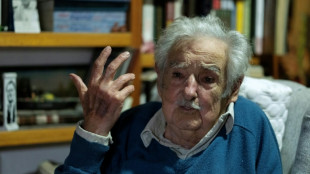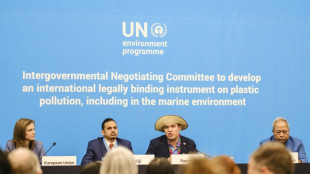
-
 Australia's Hazlewood out of 2nd India Test
Australia's Hazlewood out of 2nd India Test
-
Trudeau in Florida to meet Trump as tariff threats loom

-
 Jihadists, allies breach Syria's second city in lightning assault
Jihadists, allies breach Syria's second city in lightning assault
-
Trudeau in Florida to meet Trump as tariff threats loom: media

-
 Hunter shines as Hawks top Cavs again
Hunter shines as Hawks top Cavs again
-
Southampton denied shock Brighton win by dubious VAR call

-
 Alarm over high rate of HIV infections among young women, girls
Alarm over high rate of HIV infections among young women, girls
-
Swiss unveil Euro 2025 mascot Maddli

-
 Bears fire coach Eberflus after latest agonizing NFL defeat
Bears fire coach Eberflus after latest agonizing NFL defeat
-
Rallies mark one month since Spain's catastrophic floods

-
 Arnault family's Paris FC takeover completed
Arnault family's Paris FC takeover completed
-
Georgian police stage new crackdown on pro-EU protestors

-
 'We're messing up:' Uruguay icon Mujica on strongman rule in Latin America
'We're messing up:' Uruguay icon Mujica on strongman rule in Latin America
-
Liverpool dealt Konate injury blow

-
 Van Nistelrooy appointed Leicester manager
Van Nistelrooy appointed Leicester manager
-
Verstappen brought back to earth in Doha after F1 title party

-
 Global wine output to hit lowest level since 1961
Global wine output to hit lowest level since 1961
-
Norris boosts McLaren title hopes with sprint pole

-
 Big-hitting Stubbs takes satisfaction from grinding out Test century
Big-hitting Stubbs takes satisfaction from grinding out Test century
-
Romania recounts presidential ballots as parliamentary vote looms

-
 French skipper Dalin leads as Vendee Globe passes Cape of Good Hope
French skipper Dalin leads as Vendee Globe passes Cape of Good Hope
-
Chelsea not in Premier League title race, says Maresca

-
 Brazil's Bolsonaro aims to ride Trump wave back to office: WSJ
Brazil's Bolsonaro aims to ride Trump wave back to office: WSJ
-
France requests transfer of death row convict held in Indonesia: minister

-
 'Mamie Charge': Migrants find safe haven in Frenchwoman's garage
'Mamie Charge': Migrants find safe haven in Frenchwoman's garage
-
Iconic Uruguayan ex-leader hails country's swing left as 'farewell gift'

-
 Thousands rally in Georgia after violent police crackdown on pro-EU protesters
Thousands rally in Georgia after violent police crackdown on pro-EU protesters
-
Shared experiences make Murray 'perfect coach', says Djokovic

-
 Iran, Europeans to keep talking as tensions ratchet up
Iran, Europeans to keep talking as tensions ratchet up
-
Inflation-wary US consumers flock to 'Black Friday' deals

-
 France shows off restored Notre Dame after 'impossible' restoration
France shows off restored Notre Dame after 'impossible' restoration
-
South African bowlers strike after Sri Lanka set big target

-
 Namibia reopens polls after election chaos in ruling party test
Namibia reopens polls after election chaos in ruling party test
-
Georgia police arrest dozens in clashes with pro-EU protesters

-
 US stocks rise on Black Friday
US stocks rise on Black Friday
-
Leclerc on top for Ferrari in Qatar GP practice

-
 Jihadists, allies enter Syria's second city in lightning assault
Jihadists, allies enter Syria's second city in lightning assault
-
Amorim puts faith in Mount to turn around Man Utd career

-
 Guardiola will not 'run' from Man City rebuild
Guardiola will not 'run' from Man City rebuild
-
Assisted dying campaigners, opponents rally at UK parliament

-
 Durable prop Healy set to carve name in Irish rugby history
Durable prop Healy set to carve name in Irish rugby history
-
Macron unveils Notre Dame after 'impossible' restoration

-
 Traumatised Spain marks one month since catastrophic floods
Traumatised Spain marks one month since catastrophic floods
-
Yen rallies, euro up on rising inflation data

-
 Attack-minded Spurs boss Postecoglou says: 'You'll miss me when I'm gone'
Attack-minded Spurs boss Postecoglou says: 'You'll miss me when I'm gone'
-
Syria jihadists, allies shell major city Aleppo in shock offensive

-
 Macron inspects 'sublime' Notre Dame after reconstruction
Macron inspects 'sublime' Notre Dame after reconstruction
-
Arsenal must be near-perfect to catch Liverpool, says Arteta

-
 Arrests, intimidation stoke fear in Pakistan's politics
Arrests, intimidation stoke fear in Pakistan's politics
-
Showdown looms on plastic treaty days before deadline


Decades on, search continues for Argentina's 'stolen' children
The Grandmothers of Plaza de Mayo are getting old. Every day the hopes of finding their grandchildren, who were stolen and given up for adoption under Argentina's dictatorship, are fading.
As many as 500 children were taken from their imprisoned mothers, most of whom then disappeared under the country's brutal 1976-1983 military rule.
Most of the children were gifted to people close to the dictatorship, keen to have them raised as regime loyalists.
Only about 130 have so far been found, and the search for the others -- now adults in their 40s and 50s -- continues.
The Grandmothers of Plaza de Mayo is an organization founded in 1977 by women trying to find their arrested daughters -- and the babies they bore in captivity.
These "abuelas" take their name from the Plaza de Mayo square in Buenos Aires where brave women held protests to demand information on the whereabouts of their loved ones. They did so in vain.
As the original grandmothers get older, the organization has since been populated by a younger generation of researchers and councillors.
The rights body holds regular public meetings in the hopes of reaching people who may have questions about who they are -- questions that can be difficult to confront -- and convincing them to come forward.
Those who successfully go through a verification process can have their stolen identities "restituted."
But it is an increasingly difficult endeavor. As time goes on, those who think they may be the children of disappeared women are ever less likely to come forward.
"They come to us in various stages of doubt, some have carried the burden in silence for 20 years, sometimes more, without talking to anyone -- not even their spouse," Laura Rodriguez, coordinator of the Grandmothers' identity project told AFP.
Doubts can be triggered by a lack of physical resemblance to their parents, the absence of photos of their mothers while pregnant, or holes in the family history.
Some make several appointments for a consultation, but never show up.
Since June 2019, there have been no new restitutions, due in large part to the coronavirus pandemic putting the brakes on the Grandmothers' activities -- research and interviews with potential victims.
Six of the original grandmothers died during the pandemic.
- 'Leap into the unknown' -
At Moron, some 40 kilometers (25 miles) from Buenos Aires, six outreach meetings are planned by the Grandmothers and Argentina's human rights ombudsman for the coming weeks.
But taking that first step is not easy.
"It is a leap into the unknown," said Guillermo Amarilla Molfino, once known as "Grandson No 98" who said it took him years to seek help and then go through the restitution process.
He was reunited with his brothers, and has acted as an adviser to the Grandmothers outreach team.
"There are many fears, there is guilt, this guilt that makes us stay quiet: 'Why do I doubt my parents, why do I betray those who gave me food, a roof over my head?'" he remembers of his own experience.
"Silence can become an ally with which one lives," added Molfino. And finally accepting you are not who you thought you were can "feel like handing over your life" to someone else.
It is a difficult task for the researchers too, said Luciano Lahiteau, one of the Grandmothers team.
One needs to carefully balance an empathetic shoulder, he explained, with the "duty, not necessarily pleasant, of... picking out the reliable information from what a person tells us."
- Lottery, or loss -
Lahiteau and other researchers take the volunteers' stories and documentation, when available, and check these against civil and hospital registers, and evidence gathered from military trials.
If evidence for a match turns up, DNA can be cross-checked with a data bank holding genetic information on many, though not all, of the families searching for a missing grandchild.
When a match is found, "it is like winning the lottery!" said Rodgriguez.
But more often than not, hopes are dashed.
"We receive a lot of people who are not children of disappeared" women, said Rodriguez.
Yet, even for those who go through the process in vain, "it does a lot for identity," said Lahiteau.
"It makes it possible to recognize: 'OK, I am someone who has doubts about my identity; I have the right to try and find out where I come from," he explained.
"Really, every person comes out of the process better than they entered," added Rodriguez.
T.Bondarenko--BTB
